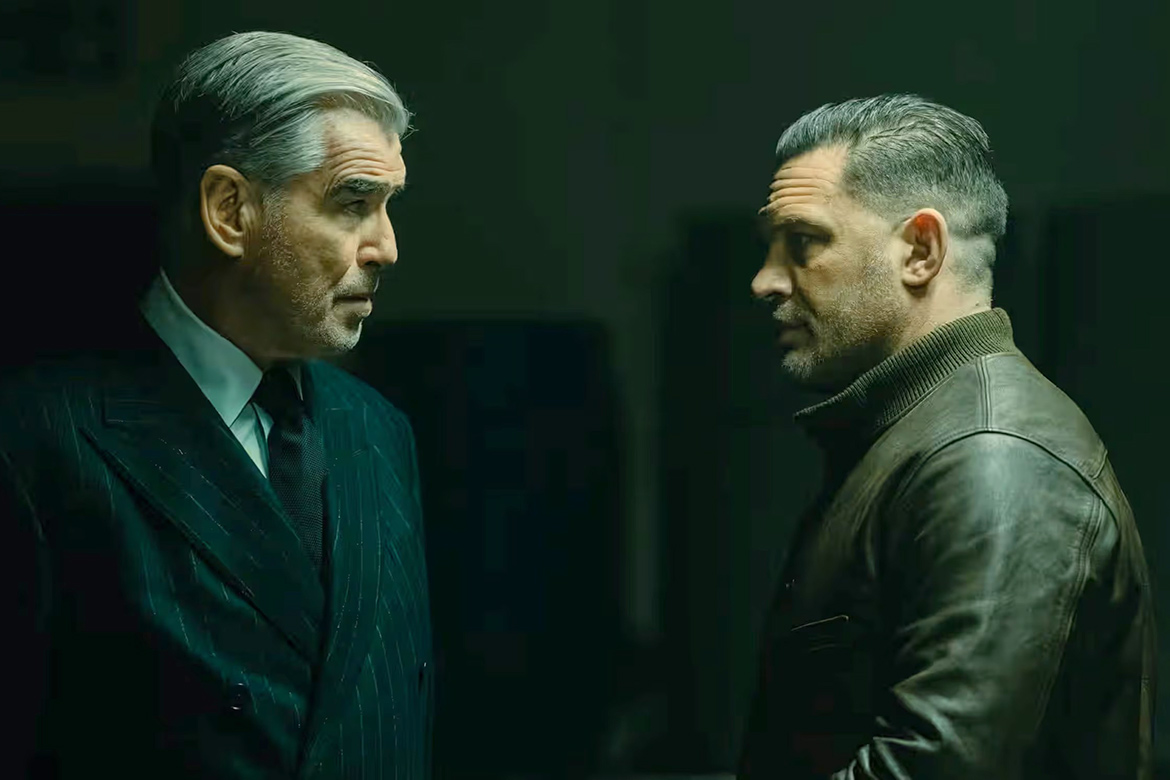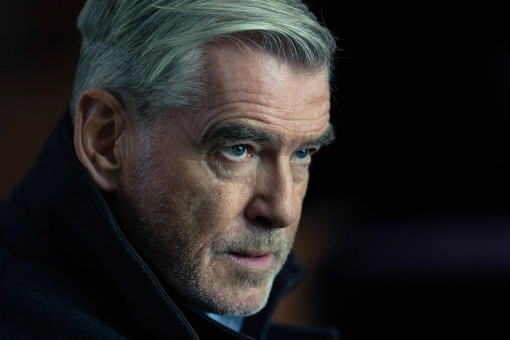For all their accomplishments as screenwriters, brothers Jez and John-Henry Butterworth may count their greatest success as learning to collaborate creatively while staying close enough to still vacation together.
They write as a duo, and they write on their own; they write for television (Prime Video’s Mammals, Epix’s Britannia), for major Hollywood movies (Spectre, Indiana Jones and the Dial of Destiny) and, in Jez’s case, for the stage, with Jerusalem and The Ferryman both acknowledged as modern classics. They were the recipients of the Writers Guild of America’s 2011 Paul Selvin Award for their screenplay of the film Fair Game.
The subject matter varies, but their stories and characters always combine moral complexity with a ready wit. A Butterworth script has humor, because, as Jez says, "That’s what growing up was like. In our house, if you said something somber and serious, even if it was true, no one gave a fuck. So, you had to make it funny, or you weren’t going to get anyone’s attention."
Both Butterworths, who grew up in St Albans, just north of London, followed older brothers into the industry (second-oldest brother Steve is a producer). When Jez was 15, he visited their brother Tom at Cambridge University, where Tom was performing in a Brian Friel play. "There was a party afterwards, and the whole thing looked like it was the best — I wanted in."
John-Henry then followed Jez to Cambridge and was bitten by the same bug. “I can remember going to visit Jez when he was a student. I could see all these opportunities — putting shows on and getting your mates to act in them. And it looked like paradise.”
Tom has since worked with Jez on several films and on Britannia, but Jez and John-Henry collaborate more often. Three of their most recent projects include serving as executive producers and writers of Showtime’s CIA drama The Agency starring Michael Fassbender; Jez is a cocreator and executive producer of Ronan Bennett’s London crime drama MobLand on Paramount+; and John-Henry is an executive producer and cocreator of Hulu’s Liane Moriarty adaptation, Nine Perfect Strangers, starring Nicole Kidman and now in its second season.
But they are not, they insist, showrunners. "I’m not really an energy that you want on set," John-Henry says, “because if everything isn’t completely perfect all the time, I go bananas.” Jez adds, "John-Henry could probably do it, but I never could — I’m just not organized in the real world in the kind of way you’d need to be." Emmy contributor Benji Wilson spoke with the brothers together in London.
You worked together most recently on The Agency. What appealed to you about that project?
John-Henry: It started off as a love of the French show Le Bureau, on which The Agency is based.
Jez: Yeah. I remember meeting [executive producer] David Glasser about two years ago in L.A., and he said, "Take a look at this show." I knew Mathieu Kassovitz, who’s the star of the French show, because I directed him in a film about a million years ago [2001’s Birthday Girl]. So, I watched the show and showed it to John-Henry. We both felt like it was not only super gripping, but that the pace and the depth of it were something we were really hungry to be involved with. It felt like it’d be fun doing an adaptation — there’s so much to translate and sink our teeth into.
John-Henry: The spy genre is pretty well-established, but it doesn’t really bear much resemblance to actual spying or espionage. The French show seemed as real as I’ve ever seen, so the opportunity to do something that felt authentic was exciting. But it wasn’t just that. There’s a romance running through it, there’s an antagonism between the guy’s job and his heart and what’s happening with his life. I haven’t seen that in anything since Casablanca — the spying is all there, but it’s kind of background for what’s happening with these characters in their romance. It’s very rare that you’ve got something with a working spine to it that you can preserve like this and take as a jumping-off point.
Do you find adaptation constricting or freeing?
John-Henry: It is enormously freeing. It means you can spend more time doing the stuff that I think is enjoyable, both to write and to watch, and less time doing the kind of nuts-and-bolts plumbing and carpentry of building a story out of whole cloth.
How do you decide whether to work on a project together or singly?
Jez: It’s entirely on gut feel. Actually, no, that’s not true: If something has a tremendous amount of technical detail in it, there’s just no way I’m going to be able to pull that off on my own. If we have to go into an area, and it’s like an "away game," and it’d be something where we’ve essentially got to do a degree in it, that I know nothing about —
John-Henry: — then it’s much easier if there’s two of you. It’s faster. If something is really technical, doing that on your own is difficult. I’ve tried it a couple of times, and it’s much easier if there’s two of you to lift something like that.
 Pierce Brosnan and Tom Hardy star in MobLand / Photo credit: Paramount+
Pierce Brosnan and Tom Hardy star in MobLand / Photo credit: Paramount+
Jez, you worked on MobLand on your own…
Jez: When I got involved in that it was already a moving train. So, I came in and did something that John-Henry and I have been doing for a couple of decades now, which is to rework something so that it can attract actors who are going to really kick the thing over. It doesn’t matter to us whether it’s a start from scratch or an adaptation or a rewrite … it’s all the same thing. You’re asking yourself, "Does this give me goosebumps? Does thinking about this make me feel excited in a way that I can’t quite explain, that might pass itself on to an audience?" And if that’s happening — and let’s face it, it happens rarely — then you’ll take it wherever you can get it.
John-Henry: It’s basically about collaboration. Sometimes you’ve got silent collaborators. Sometimes they’re in the room. Sometimes it’s the source material or the IP. But they’re all just ways of working with something.
Jez: If you want to come up with a musical analogy, you can liken it to remixing — how do you make this song really catch the ear?
John-Henry: And it is sometimes nice to play with a key that’s already established or with a set of chords.
Jez: Formal limitations are really freeing.
Nine Perfect Strangers, on which you are an EP, John-Henry, is another adaptation.
John-Henry: That started out right before Covid, and it was supposed to shoot in L.A. It was me and David E. Kelley creating it together. I wrote the first three episodes of it with David, and then Covid hit, and they had to kick and scramble to try to keep it going. Happily, they were able to do that. But then it shot in Australia, and I was locked down in London, and David was locked down in L.A., so my involvement in it became truncated by the whole Covid thing. But that’s how I got the credit on it. I guess I laid out the foundation but didn’t really build the house.
It’s interesting that you often refer to music in your analogies. Music always features prominently in your writing and is always carefully curated in your shows and stage plays.
John-Henry: Enormously so; music is a big inspiration for us both materially and spiritually.
Jez: The songs that stay with me haunt me … there’s something in them I can’t solve. Like Neil Young’s “After the Gold Rush”: "I was thinking about what a friend had said / I was hoping it was a lie." I heard that 50 years ago. And I still don’t know what it was that the friend said, but it sort of sits with you in a way that unsettles. Anything that’s got that at the heart of it is what you want. Songs are a really good way to look at writing, to look at what you want a scene to do, in essence, which is to do that goosebumps thing. I love laughing, I love crying at drama, but that feeling of "This is unsettling me" — those are the things you remember the most. And I think it happens for me more in songs than it does in drama.
John-Henry: A lot of drama at the moment is written or created in quite a high register. It’s coming at the audience in a bombastic way, just to keep its head above the water in this busy world. The type of effect that Jez is talking about makes an audience lean forward rather than back. It makes an audience concentrate harder, rather than defend themselves against how loud it’s getting on the screen. So, I do think there’s a close relationship to the sort of music that I like and the types of poems and writing that I’m drawn to, and the stuff that I like doing.
Brothers don’t always get along. How do you work together?
John-Henry: It’s changed quite a lot, hasn’t it? It was a lot more tempestuous when we were younger. It was actually not to do with us, it was to do with the process and the fact that it was harder, and we would get lost a lot more, and we’d blame each other for that and not take responsibility. I don’t think that happens anymore — it’s become a much calmer and more reciprocal process than anything else.
Jez: If you’re not feeling the level of excitement we’re talking about that you can get in a scene, or that you can get in a line; if you don’t feel the thing that we know you can feel, then there’s no point in arguing about why it’s not there. You’ve just got to keep fighting, looking for it. It’s like arguing about why you didn’t catch a fish. You’ve just got to go back to the river and keep trying. So, there’s a lot less hand-wringing and frustration these days about why it’s not working, and a lot more attempts to try and score goals.
Are you competitive?
Jez: There is a competitive element to it. You definitely get that in a sibling relationship. I was always shit on a skateboard, and it’s like being able to do tricks on a skateboard. You know what I mean? It’s being able to do stuff like, "Wow, that looks really cool."
John-Henry: You never write on anything simultaneously. It’d be impossible to sit there with another person with four hands on a keyboard. It’s an exchange. You’re either talking about it in front of a whiteboard, or you’re sending each other stuff that you’ve written in separation. But the truth is you can tell when something’s good; even when we’re not writing together on stuff, I feel Jez’s presence when I’m writing something. If no one’s watching, and I’m trying to get away with a scene that isn’t quite up to standard, I’ll suddenly think, "Well, I wouldn’t send this to Jez," so I’ve got to carry on.
This article originally appeared in emmy Magazine, issue #8, 2025, under the title "Sibling Revelry."














